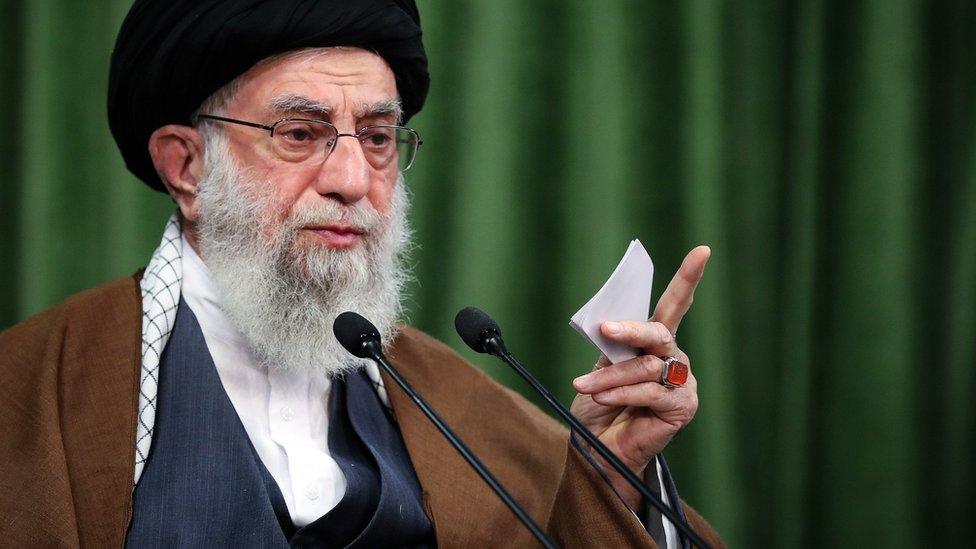Iran's Supreme Leader: Who might succeed Ali Khamenei?
- Published

Recent rumours about the health of Iran's Supreme Leader, Ayatollah Ali Khamenei, have thrown the spotlight on what will happen if he becomes too ill to rule, or dies.
The 81-year-old is the highest political authority in one of the most powerful countries in the Middle East, and who will succeed him matters greatly to Iran, the region and the rest of the world.
How is the Supreme Leader chosen?
The holder of the post (Ayatollah Khamenei is only the second since Iran's Islamic Revolution in 1979) is picked by a body of 88 clerics known as the Assembly of Experts.
Its members are elected by Iranians every eight years, but the candidates first have to be approved by a committee called the Guardian Council. Members of the Guardian Council itself are either directly or indirectly chosen by the Supreme Leader.
The Supreme Leader therefore has influence over both bodies. Over the last three decades, Ali Khamenei has ensured the election of conservatives to the assembly who would follow his guidance on choosing his successor.
The Assembly of Experts appoint the Supreme Leader and can - theoretically - remove him
Once elected, the Supreme Leader may remain in that position for life.
According to Iran's constitution, the Supreme Leader has to be an ayatollah, a senior Shia religious figure. But when Ali Khamenei was chosen he was not an ayatollah, so the laws were changed to enable him to accept the job.
Therefore, it is possible laws can be changed again, depending on the political climate when the time to choose a new leader comes.
Why does it matter?
The Supreme Leader has ultimate power in Iran. He has the final say on the most important issues, and shapes its policies and approach to the outside world.
Iran is the most powerful Shia country in the world and under Ali Khamenei's leadership it has sought to expand its influence in the Middle East.
The Supreme Leader is positioned at the top of Iran's political power structure
His death may not only change the course of history in the region, but could reverberate around the world.
The hostility between Iran and the United States and Israel, for instance - fuelled to a great extent by Ayatollah Khamenei's personal loathing of both - has led to years of tension and instability.
However, the mechanics of the succession process mean that whoever replaces him is likely to continue his path.
Who might be the next Supreme Leader?
The Islamic Republic's political factions have a deep interest in shaping the next succession, but there is no single powerful figure who can act like a kingmaker in order to prevent a crisis.
Lacking the same allegiances as his predecessor, Ali Khamenei has maintained his influence through a personal network of loyalists, many of whom belong to Iran's most powerful force, the Revolutionary Guards.
The Revolutionary Guards, led by Maj Gen Hossein Salami, is a major military, political and economic force in Iran
It is likely that the Revolutionary Guards will try to prevent any candidates they consider unfavourable from becoming the next Supreme Leader.
Although there have been rumours of a top-secret list of names, no-one knows - and no-one has claimed to know - who is on it.
Anecdotal accounts say Ali Khamenei's preferred candidate could either be his son Mojtaba or the Judiciary Chief Ebrahim Raisi - which if true could carry some weight.
Mr Raisi's predecessor, Sadeq Larijani, and the current President Hassan Rouhani, are also believed to have aspirations of becoming the next Supreme Leader.
Who is Mojtaba Khamenei?
The Supreme Leader's 51-year-old-son is a shadowy character. He was born in the religious city of Mashhad and, like his father, is a cleric.
Mojtaba came into the spotlight during the violent crackdown on the protests that followed a disputed presidential election in 2009. He was believed to have been in charge of the crackdown.
Although Ali Khamenei is not a king and cannot simply pass the throne to his son, Mojtaba has significant power within his father's hardline circles, including the powerful Supreme Leader's office, which overshadow constitutional bodies.
If he gains the support of the Revolutionary Guards, they may influence the legal selection process in his favour.
Who is Ebrahim Raisi?
The 60-year-old cleric was also born in Mashhad.
He is believed to be the most likely candidate to succeed Ayatollah Khamenei.
He has never refuted rumours about his aspirations to become the next Supreme Leader and many of his moves suggest that he is being groomed for the role.
He has held several posts in the judiciary and is the deputy chairman of the Assembly of Experts.
Raisi's human rights record, particularly his role in the mass executions of political prisoners in 1988, means he lacks popular support. But despite losing in the 2017 presidential election, the Supreme Leader appointed him as the head of Judiciary.
Since taking on that role, he has increased his media presence and has staged a so-called "war on corruption". Like Ali Khamenei, Raisi is a sceptic of Iran's 2015 nuclear deal and is strongly allied with the Revolutionary Guard.
Related topics
- Published9 March 2020
- Published14 October